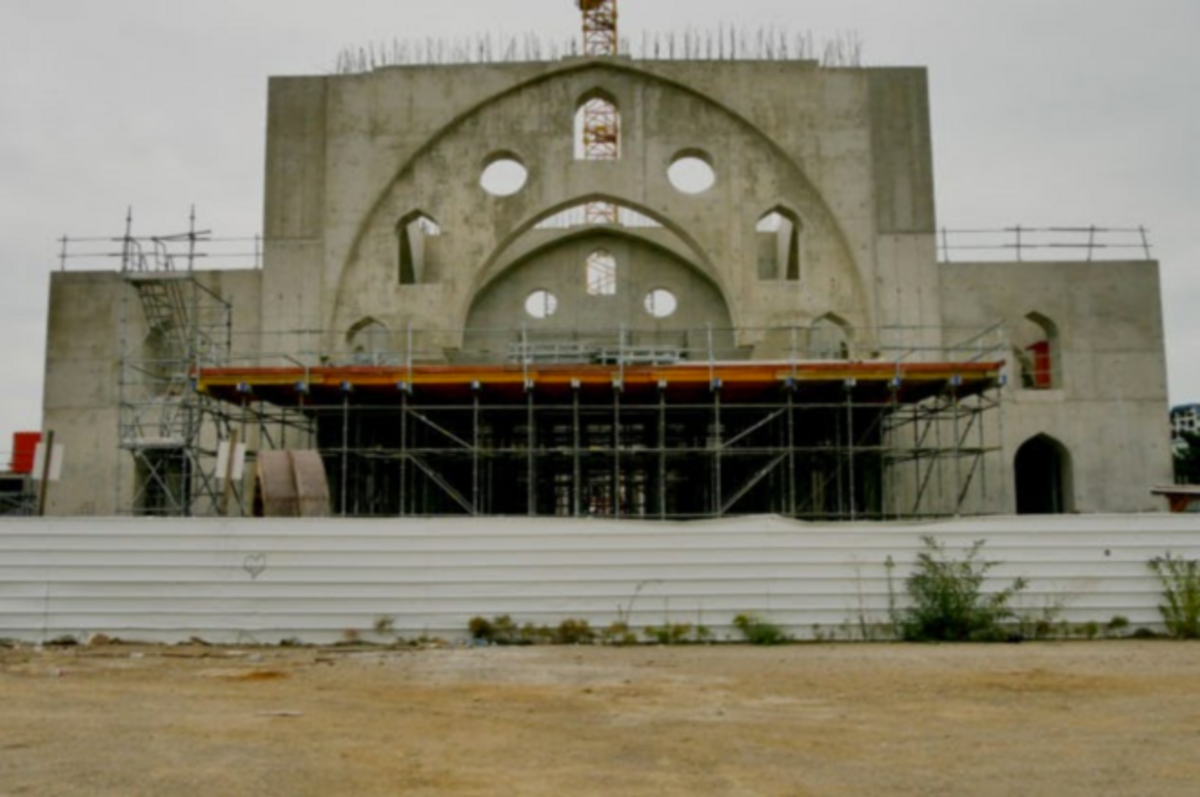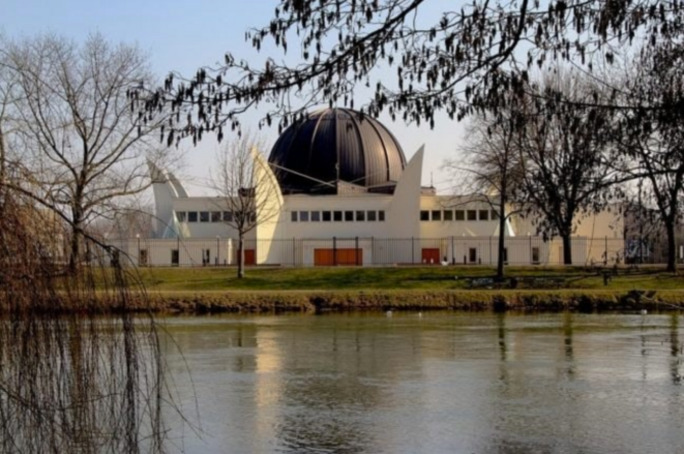The decision had already caused some misgivings within the ranks of the ruling majority on Strasbourg city council, headed by Green mayor Jeanne Barseghian. And it just took one Tweet from France's interior minister Gérald Darmanin for it to become a full-blown national controversy. On the evening of Monday March 22nd 2021 the municipal council in the north-eastern city voted in principle for a 2.5 million-euro grant to aid the construction of the planned Eyüp Sultan mosque in Strasbourg's Meinau district. Work on this new place of worship started in 2015 and then stopped in the summer of 2019 because of a shortage of cash before resuming at the end of 2020.
Ahead of the vote the city councillor in charge of relations with religious groups, Jean Werlen, said he hoped the mosque would be completed by the autumn of 2022 and inisted that the paperwork was all in order. “This mosque has made big efforts to conform to the administrative rules, they already have an external accountant, and the city of Strasbourg has asked the majority of the mosques to separate the religious and cultural parts in their accounts,” he said.

Enlargement : Illustration 1

However, this did not stop interior minister Gérald Darmanin wading into the issue and using the occasion to defend again the proposed law on 'separatism' that is currently going through the French Senate. Darmanin noted that the Strasbourg grant is helping the Confédération Islamique Milli Görüs (CIMG), one of two Franco-Turkish associations which have refused to sign the government's new “charter of principles” for Islam in France.
Attacking the council, which is run by the Écologie-Les Verts (EELV) party, the minister Tweeted: “The Green-run city hall of Strasbourg is financing a mosque that is supported by a federation which has refused to sign the charter of principles for Islam in France and which supports a politicised Islam. I want everyone to wake up and for the separatism law to be voted through soon and become law.”
And he told BFM TV news channel: “We consider that this local authority should not have financed foreign meddling on our soil.” Marlène Schiappa, the minister for citizenship, also joined in the controversy, declaring on BFM TV: “The Greens have a problem with the principles of the Republic … you don't negotiate with the Republic's values.”
On Tuesday, the interior minister asked the prefect in the Bas-Rhin département or county where Strasbourg is located to refer the grant decision to an administrative judge. However, it was not immediately clear on what grounds the move could be contested.
Unlike in the rest of the country, in this north-east corner of France local authorities are allowed to support the construction of religious buildings. This is under the terms of the 'concordataire d’Alsace-Moselle' or 'Concordat in Alsace-Moselle' which is based on a law dating back to Napoleonic times. The 1905 French law that provided for a strict separation between church and state removed this provision for most of France but because at the time Alsace-Moselle was under German rule the law did not take effect there. The concordat has remained in force ever since.
The concordat originally applied to the Catholic, Protestant and Jewish faiths but has since been extended to Islam, under the principle of “equality of responsibilities, equality of rights” espoused by Roland Ries who was Strasbourg's mayor from 2008 to 2020. Even before him Fabienne Keller, the conservative mayor of Strasbourg from 2001 to 2008, had overseen a municipal payment of 10% of the construction budget for the city's great mosque.
For more than two decades successive city authorities have thus used the local concordat to help religious groups with their buildings. They have granted funds up to 10% of the overall project cost, obtained long leases for land and changed local planning laws to allow religious activities to take place.
It was by applying this long-standing practice that the ruling Green majority on the city council set out its plans for a 2.5 million euro grant to help the construction of the Eyüp Sultan Mosque in the city's Meinau district. However, faced with objections from the opposition and also from some within her own majority, mayor Jeanne Barseghian agreed to some slight modifications in the text of the deal. The decision that was finally voted on Monday night states that the city will help fund the building of the Eyüp Sultan Mosque in principle. But it imposes a condition that the grant is subject to a new vote by the city council after what it calls “strengthening and approval of the funding plan”. This compromise did not satisfy opposition groups who still voted against it.
City Hall in Strasbourg was unable to supply Mediapart with a copy of the council's decision in 1989 which stated that it was permitted to fund the construction of religious buildings to a maximum of 10% of the project cost. Councillor Jean Werlen admitted: “Everyone quotes this decision but we cannot find any trace of it.” However, the councillor in charge of relations with religious bodies said that in 1999 this decision was “extended to religions not covered under the concordat”. He added: “As a result, every religion could benefit from a grant up to 10% of the cost of the work.”
In fact, the copy of the 1999 decision sent to Mediapart by the council does not mention the level of the grant permitted, though it does extend the provisions of the concordat beyond the three faiths of the original document. A source close to the case said: “While the 10% is not expressly mentioned, the reference to equality of treatment that the decision sets out in itself leads to the application of the same criteria for the Muslim faith as for the [previously] recognised faiths.”
At a press conference on Tuesday March 23rd Jeanne Barseghian responded to her critics by pointing to these local decisions and the Alsace-Moselle agreement. “I respect the local laws and the concordat laws that allow a municipal authority to fund 10%, that's what we have done for decades, that's what we've done since 1999,” she said. “It seems an enormous sum but since 2008 the city authority has spent 22 million on different religions and the Muslim religion has received a lot less than other religions.” In fact, out of that overall sum the Muslim faith has received 3.7 million while the Catholic and Protestant faiths were given 8.6 million and 7.7 million euros respectively over the 12-year period.

Enlargement : Illustration 3

However, the approach of Greens on the city council towards this latest grant broke with precedent. First of all, it decided to help finance a project on which work had already begun. This approach had been rejected by the previous mayor Roland Ries. On October 16th 2017, after work had begun on the Meinau mosque build, he told the Dernières Nouvelles d’Alsace newspaper: “It's the rule, you can't fund as you go along. That's the general rule for any project. And there was also no request [editor's note, for funding].”
As mayor from 2001 to 2008 Fabienne Keller closely followed the case of the first mosque to receive grant funding from Strasbourg, the city's great mosque. Keller, who is now a member of the European Parliament, explained the procedure: “It's the same principle as with any grant, you discuss before the start of the work so you can amend the shape of the building, traffic management, the planning application. For the Strasbourg great mosque I had wanted to reduce the scale of the project so that it was in keeping with the local community.” The cost of the project went down from 17 million euros to 8 million euros.
Former socialist councillor Mathieu Cahn, the assistant mayor for the Meinau district before being removed from the list of candidates at the 2020 municipal elections, pointed out that for another mosque that was built in the area “we decided on the 10% before the first stone was laid”. He also noted that the Confédération Islamique Milli Görüs (CIMG) had not asked for a municipal grant before starting work on its project in 2015. “If we'd have had financial discussions I would have argued for the project to be more affordable, with a level of financing equivalent to that of the great mosque, so that there isn't a feeling that one is favouring one more than others,” he said.
During Monday's council meeting in Strasbourg several opposition councillors criticised the lack of transparency over the plan to finance the project. City Hall declined to send Mediapart the relevant information on this funding. Nor did it make the financial plan available as part of the official debate. So it was only by reading Rue89 Strasbourg that several councillors learned that the Confédération Islamique Milli Görüs - Eyüp Sultan Great Mosque association was also expecting grants from both the département and regional councils to fund a further 16% of the project. The city councillors were unsure how to react to this news, given that the two authorities in question had never expressed any desire to support the building work financially. “When we voted for the grant for the Strasbourg great mosque I already knew that the region and the département were each going to fund 8% of the work,” recalled Fabienne Keller.
The final weak point in the way the city council's ruling majority handled the issue was a lack of any assurance that the Turkish state had not interfered in the process. The city authorities appear not to have noticed that a foreign entity wields considerable power inside the association running the project. The headquarters of the Milli Görüs Islamic movement is in Germany and decisions taken over the Eyüp Sultan mosque cannot be made without the agreement of the leadership in Cologne. In fact, Rue89 Strasbourg has seen a confidential protocol agreement that gives a right of veto to the president of the Milli Görüs Islamic movement, Kemal Ergün, thanks to his presidency of another group, the European Mosque Construction and Support Community (EMUG).
During the press conference on March 23rd the mayor of Strasbourg acknowledged the need for “transparency over the origin of the financing” of the mosque. “But it must be done systematically for everyone, I must be able to provide equality of treatment for all faiths,” added Jeanne Barseghian, who rejected any suggestion that she was supporting a separatist organisation. And she turned the issue back on the French state. “If the government, if the minister of the interior, have proof that funding this mosque means funding a radical association then let them give us the information so that we can take action as a result. But so far the state has not informed me of anything,” said the mayor.
On the eve of Monday's decision, the councillor in charge of relations with local religious groups, Jean Werlen, seemed unaware of the controversy that this grant would cause first at a local and then at a national level. “In a way, if you go back to the Parliamentary debate [editor's note, on separatism] over recent months, you can't on the one hand say that you don't want money coming from a foreign country [editor's note, to finance religious projects] while on the other hand state that they won't get any money from the city of Strasbourg either,” he said.
-------------------------
If you have information of public interest you would like to pass on to Mediapart for investigation you can contact us at this email address: enquete@mediapart.fr. If you wish to send us documents for our scrutiny via our highly secure platform please go to https://www.frenchleaks.fr/ which is presented in both English and French.
-------------------------
- The original French version of this article can be found here.
English version and additional reporting by Michael Streeter


